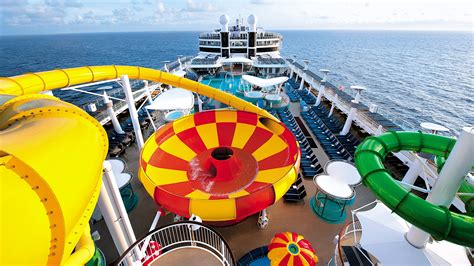
A mother and daughter were left behind in Nassau, Bahamas, after a shore excursion delay caused them to miss the departure of the Norwegian Epic cruise ship, sparking questions about the cruise line’s protocols and passenger accountability.
Jamie and Emily Lynn, traveling from South Carolina, found themselves stranded in Nassau on Tuesday, May 28th, after a snorkeling tour ran significantly behind schedule. According to Jamie Lynn, the excursion, booked independently, was delayed due to another passenger requiring medical attention, preventing them from returning to the port in time for the ship’s scheduled 3:00 PM departure. When they arrived at 3:20 PM, the Norwegian Epic was already gone, leaving them to grapple with the logistics and expense of rejoining the cruise.
“We arrived at 3:20 p.m., and the ship was gone,” Jamie Lynn told Yahoo Lifestyle. “I was panicking because I didn’t have my passport, my medication, or anything.”
The incident has ignited a debate over the responsibilities of cruise lines to ensure passengers return on time from shore excursions and the consequences for those who miss the ship. Norwegian Cruise Line has stated that passengers are responsible for returning to the ship on time, a policy that is standard across the cruise industry. However, the Lynns’ situation has raised concerns about the adequacy of communication and support provided to passengers in such circumstances.
The Lynns were ultimately able to re-join the Norwegian Epic in Cozumel, Mexico, after incurring unexpected expenses for flights, accommodation, and other necessities. The experience has left them frustrated and seeking compensation for their ordeal.
The Stranded Passengers: A Detailed Account
Jamie and Emily Lynn embarked on what was intended to be a relaxing cruise vacation aboard the Norwegian Epic. The cruise itinerary included a stop in Nassau, Bahamas, where they decided to participate in a snorkeling excursion. This decision, however, led to an unforeseen and stressful situation.
The Lynns booked their snorkeling tour independently, a common practice among cruise passengers seeking to explore destinations on their own terms. While cruise lines offer their own organized excursions, many passengers opt for independent tours to find more personalized experiences or better deals. The risk, however, lies in the fact that the cruise line is not directly responsible for the operations and schedules of independently booked tours.
According to Jamie Lynn, their snorkeling tour experienced a significant delay due to a medical emergency involving another passenger. The delay pushed their return to Nassau beyond the Norwegian Epic’s scheduled departure time. Upon arriving at the port at 3:20 PM, they discovered that the ship had already left, leaving them stranded.
The immediate consequences of missing the ship were significant. Jamie Lynn found herself without her passport, medication, and personal belongings, all of which were onboard the Norwegian Epic. This created a sense of panic and uncertainty as they tried to figure out their next steps.
Cruise Line Policies and Passenger Responsibility
Norwegian Cruise Line, like most cruise operators, has a clear policy regarding passenger responsibility for returning to the ship on time. This policy is typically outlined in the cruise contract and communicated to passengers before and during the voyage. The cruise line asserts that it is the passenger’s responsibility to manage their time and ensure they are back on board before the scheduled departure.
“We always encourage guests to allow ample time when participating in tours, especially those not organized by Norwegian Cruise Line,” a spokesperson for Norwegian Cruise Line stated.
This policy is in place to maintain the ship’s schedule and minimize disruptions to the overall cruise itinerary. Cruise ships operate on tight schedules, and delays can have cascading effects on subsequent ports of call and the overall cruise experience for all passengers.
However, critics argue that cruise lines should provide more support and assistance to passengers who miss the ship, particularly in situations where the delay is due to unforeseen circumstances beyond the passenger’s control. The Lynns’ case highlights the potential for miscommunication and the lack of clear procedures for assisting stranded passengers.
The Aftermath and Journey to Rejoin the Ship
After being left behind in Nassau, Jamie and Emily Lynn faced the daunting task of rejoining the Norwegian Epic. They contacted the cruise line and worked to arrange transportation to the next port of call, Cozumel, Mexico. This involved booking flights, finding accommodation in Nassau, and coordinating with the cruise line to ensure they could board the ship upon arrival in Cozumel.
The unexpected expenses associated with rejoining the cruise added to the stress and frustration of the situation. The Lynns had to pay for flights, accommodation, meals, and other necessities, all of which were not part of their original cruise budget. The financial burden further compounded the emotional toll of being stranded in a foreign country.
Upon arriving in Cozumel, the Lynns were finally able to re-board the Norwegian Epic. However, the experience had left a lasting impact on their vacation. They felt that the cruise line could have done more to assist them in Nassau and that the communication and support provided were inadequate.
Debate Over Cruise Line Responsibility
The Lynns’ case has reignited the debate over the responsibilities of cruise lines to their passengers, particularly in situations where passengers miss the ship due to circumstances beyond their control. While cruise lines maintain that passengers are ultimately responsible for their own time management, critics argue that there is a moral and ethical obligation to provide assistance and support to those who find themselves stranded.
Some argue that cruise lines should have more robust communication systems in place to alert passengers of potential delays and to provide guidance on what to do if they miss the ship. Others suggest that cruise lines should offer travel insurance options that cover the costs associated with missing the ship, providing passengers with a financial safety net in such situations.
The Lynns’ experience has also raised questions about the cruise line’s responsibility to verify that all passengers are on board before departing a port. While it may not be feasible to conduct a thorough headcount of every passenger, some argue that cruise lines should implement more stringent procedures to minimize the risk of leaving passengers behind.
Legal and Contractual Considerations
The legal and contractual aspects of cruise travel further complicate the issue of passenger responsibility. Cruise contracts typically contain clauses that limit the cruise line’s liability for events that occur off the ship, including delays and missed departures. These clauses often state that the cruise line is not responsible for the actions of independent tour operators or for events that are beyond its control.
However, there may be circumstances in which a cruise line can be held liable for leaving a passenger behind. For example, if the cruise line was negligent in providing information about the ship’s departure time or if it failed to provide adequate assistance to a passenger who was trying to return to the ship, a court may find the cruise line liable for damages.
The Lynns are exploring their legal options and considering whether to pursue a claim against Norwegian Cruise Line for the expenses and distress they incurred as a result of missing the ship. Their case may serve as a test case for future disputes over cruise line responsibility and passenger rights.
Impact on the Cruise Industry
The incident involving the Norwegian Epic and the Lynns has the potential to impact the broader cruise industry. Cruise lines are increasingly aware of the importance of passenger satisfaction and the potential for negative publicity to damage their reputation. As a result, they may be more willing to review their policies and procedures to ensure that passengers are adequately protected in situations where they miss the ship.
The cruise industry may also face increased scrutiny from regulators and consumer advocacy groups, who may push for greater transparency and accountability in the way cruise lines handle such incidents. The Lynns’ case could serve as a catalyst for change, leading to improvements in cruise line policies and a greater emphasis on passenger welfare.
Frequently Asked Questions (FAQ)
-
What happened to Jamie and Emily Lynn?
- Jamie and Emily Lynn, a mother and daughter from South Carolina, were left behind in Nassau, Bahamas, after a shore excursion delay caused them to miss the departure of the Norwegian Epic cruise ship.
-
Why did they miss the ship’s departure?
- They missed the ship due to a delay on an independently booked snorkeling tour. The tour was delayed because another passenger required medical attention, causing them to return to port after the ship’s scheduled departure time of 3:00 PM. They arrived at 3:20 PM to find the ship gone.
-
What did Norwegian Cruise Line say about the incident?
- Norwegian Cruise Line stated that passengers are responsible for returning to the ship on time, especially when participating in tours not organized by the cruise line.
-
How did Jamie and Emily Lynn rejoin the cruise?
- They were able to rejoin the Norwegian Epic in Cozumel, Mexico, after incurring unexpected expenses for flights, accommodation, and other necessities.
-
What are the broader implications of this incident?
- The incident has ignited a debate over the responsibilities of cruise lines to ensure passengers return on time from shore excursions and the consequences for those who miss the ship. It raises questions about communication, support provided to passengers in such circumstances, and potential changes in cruise line policies.
In-Depth Analysis of the Incident
The case of Jamie and Emily Lynn being left behind by the Norwegian Epic is more than just an unfortunate travel mishap; it’s a complex situation highlighting several critical aspects of the cruise industry and passenger responsibilities. This in-depth analysis will explore the various dimensions of the incident, including the cruise line’s policies, the risks associated with independent excursions, the communication challenges, and the broader implications for the cruise industry.
Cruise Line Policies and the Fine Print
Cruise lines operate under a strict schedule, and adherence to this schedule is paramount for the smooth operation of the voyage. This necessity is reflected in their policies, which clearly state that passengers are responsible for returning to the ship on time. These policies are usually outlined in the cruise contract, a lengthy document that passengers often skim through or overlook entirely.
The cruise contract is a legally binding agreement that defines the rights and responsibilities of both the cruise line and the passenger. Within this contract, there are typically clauses that limit the cruise line’s liability for events that occur off the ship. This means that if a passenger misses the ship due to a delay on an independent excursion, the cruise line is generally not held responsible for the costs and inconveniences associated with rejoining the cruise.
However, the extent to which these clauses are enforceable can vary depending on the specific circumstances of the case and the jurisdiction in which the dispute is resolved. In some cases, courts have ruled that cruise lines have a duty to provide reasonable assistance to passengers who miss the ship, even if the delay was not the cruise line’s fault.
The Risks of Independent Excursions
While cruise lines offer a variety of organized shore excursions, many passengers opt for independent tours for various reasons, including cost savings, personalized experiences, and the desire to explore destinations at their own pace. However, independent excursions come with inherent risks, as the cruise line has no control over the operations and schedules of these tours.
If an independent tour is delayed or canceled, the passenger is solely responsible for making alternative arrangements to return to the ship on time. This can be particularly challenging in foreign countries where language barriers, unfamiliar transportation systems, and limited access to communication can create significant obstacles.
In the Lynns’ case, the delay on their snorkeling tour was due to a medical emergency involving another passenger. While such events are unpredictable, they highlight the potential for disruptions that can jeopardize a passenger’s ability to return to the ship on time.
Communication Challenges and the Need for Better Support
One of the key issues raised by the Lynns’ experience is the need for better communication and support for passengers who miss the ship. While cruise lines typically provide contact information for their port agents, it can be difficult for stranded passengers to navigate the complexities of arranging transportation and accommodation in a foreign country.
In the digital age, there are opportunities for cruise lines to leverage technology to improve communication and provide more effective support. For example, cruise lines could develop mobile apps that provide real-time updates on ship departure times, information on local transportation options, and access to emergency assistance services.
Cruise lines could also establish partnerships with local service providers to offer discounted rates on transportation and accommodation for stranded passengers. By providing a more comprehensive support system, cruise lines can help alleviate the stress and uncertainty associated with missing the ship.
The Broader Implications for the Cruise Industry
The incident involving the Norwegian Epic and the Lynns has the potential to impact the broader cruise industry in several ways. First, it may prompt cruise lines to review their policies and procedures regarding passenger responsibility and support. Cruise lines may consider offering more flexible cancellation policies for shore excursions, providing better communication tools, and establishing partnerships with local service providers.
Second, the incident may lead to increased scrutiny from regulators and consumer advocacy groups. These organizations may push for greater transparency and accountability in the way cruise lines handle incidents involving stranded passengers. They may also advocate for stronger consumer protections, such as mandatory travel insurance requirements and clearer disclosure of liability limitations.
Third, the incident may influence consumer perceptions of cruise travel. Passengers may become more cautious about booking independent excursions and may place greater emphasis on purchasing travel insurance that covers the costs associated with missing the ship. Cruise lines may need to address these concerns by highlighting the benefits of organized shore excursions and by offering more comprehensive travel insurance options.
Ethical Considerations and Duty of Care
Beyond the legal and contractual aspects, the incident raises important ethical considerations regarding the cruise line’s duty of care to its passengers. While cruise lines may argue that passengers are ultimately responsible for their own time management, there is a moral obligation to provide assistance and support to those who find themselves in distress, especially when they are in a foreign country and facing unexpected challenges.
The principle of duty of care suggests that cruise lines have a responsibility to take reasonable steps to protect their passengers from harm and to provide assistance when they are in need. This responsibility extends beyond the confines of the ship and includes providing support to passengers who miss the ship due to unforeseen circumstances.
While cruise lines may not be legally obligated to cover all the costs associated with rejoining the cruise, they should at least provide guidance, resources, and logistical support to help stranded passengers navigate the situation and return to the ship as quickly and safely as possible.
Potential Solutions and Recommendations
To prevent similar incidents from occurring in the future, cruise lines should consider implementing the following solutions and recommendations:
- Enhanced Communication: Develop mobile apps that provide real-time updates on ship departure times, information on local transportation options, and access to emergency assistance services.
- Flexible Cancellation Policies: Offer more flexible cancellation policies for shore excursions, allowing passengers to cancel or reschedule their tours without penalty in the event of unforeseen circumstances.
- Partnerships with Local Service Providers: Establish partnerships with local service providers to offer discounted rates on transportation and accommodation for stranded passengers.
- Comprehensive Travel Insurance: Offer more comprehensive travel insurance options that cover the costs associated with missing the ship, including flights, accommodation, and other expenses.
- Improved Headcount Procedures: Implement more stringent procedures to verify that all passengers are on board before departing a port, such as scanning boarding passes or conducting visual checks.
- Training for Crew Members: Provide training for crew members on how to assist stranded passengers and how to communicate effectively in emergency situations.
- Transparency and Disclosure: Clearly disclose the cruise line’s policies regarding passenger responsibility and liability limitations in the cruise contract and on the cruise line’s website.
By implementing these solutions and recommendations, cruise lines can demonstrate a commitment to passenger welfare and reduce the risk of similar incidents occurring in the future.
The Future of Cruise Travel
The cruise industry is a dynamic and evolving sector that is constantly adapting to changing consumer preferences and technological advancements. As the industry continues to grow and expand, it is essential that cruise lines prioritize passenger safety, security, and satisfaction.
The incident involving the Norwegian Epic and the Lynns serves as a reminder of the importance of clear communication, comprehensive support, and ethical responsibility in the cruise industry. By learning from this experience and implementing the solutions and recommendations outlined above, cruise lines can ensure that cruise travel remains a safe, enjoyable, and memorable experience for all passengers.
The rise of social media and online review platforms has also increased the importance of managing cruise line reputation. Incidents such as this can quickly go viral, impacting public perception and future bookings. This adds another layer of pressure on cruise lines to proactively address and mitigate potential issues.
Conclusion
The case of Jamie and Emily Lynn being left behind in Nassau is a stark reminder of the potential pitfalls of cruise travel and the importance of passenger preparedness. While cruise lines have policies in place to maintain their schedules and limit their liability, there is a clear need for improved communication, enhanced support, and a greater emphasis on ethical responsibility.
By implementing the solutions and recommendations outlined in this analysis, cruise lines can demonstrate a commitment to passenger welfare and ensure that cruise travel remains a safe, enjoyable, and memorable experience for all. The incident serves as a valuable lesson for both cruise lines and passengers, highlighting the importance of proactive planning, clear communication, and a shared responsibility for ensuring a smooth and successful cruise experience.
Ultimately, the goal should be to create a cruise environment where passengers feel supported and protected, even when unexpected challenges arise. This requires a collaborative effort between cruise lines, passengers, and regulatory bodies to establish clear guidelines, implement effective procedures, and foster a culture of ethical responsibility within the cruise industry.









